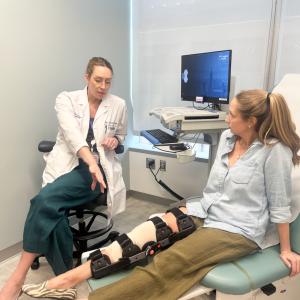
Photo: Ivan-balvan/Getty
Your doctor recommends an additional surgery to relieve your back pain, but spinal fusion is a major procedure. You are wondering if the procedure will yield better results, or if you should wait before considering surgery again.
Uncertainty about a surgical procedure is a common reason people seek a second opinion. When you are faced with questions about your healthcare, consulting another medical expert can help you get answers. Whether a second opinion leads to a new diagnosis and treatment plan, or confirms your doctor’s recommendation, it provides information and insights you need to make decisions about your care.
Even if you trust your doctor, seeking a second opinion can help clarify your situation. “There are more treatment options than ever for many diseases and conditions,” says Joseph D. Zuckerman, MD, the Walter A.L. Thompson Professor of Orthopedic Surgery and chair of the Department of Orthopedic Surgery at NYU Grossman School of Medicine. “With a second opinion, you are able to more fully understand your choices and play an active role in your care.”
When to Get a Second Opinion
While having questions about surgery is one of the most common reasons for seeking a second opinion, there are other situations in which consulting another expert can make a difference. Here are some of the reasons to get a second opinion:
- You have a rare condition in which a different physician might have more experience or training.
- You are confused about your diagnosis or the treatment options available to you, and you want more information.
- Your symptoms have not improved after a recommended treatment.
- You want assurance that all treatment options have been presented to you.
- You believe your first diagnosis is incorrect.
- You have received a new diagnosis of an orthopedic condition or are struggling with chronic joint pain.
You may worry that telling your doctor you want a second opinion will be awkward. But in most cases, it won’t be. Especially when it comes to complex conditions or specialized surgical procedures, many doctors expect their patients to seek a second opinion. In fact, your doctor may even make arrangements to help you get another opinion. It’s a powerful way to ensure you get the best care.
Here’s some language you might use with your doctor: “I want to know as much about this condition as possible. Can you recommend another specialist you trust?” For an unbiased second opinion, ask for a referral to a different medical institution from where you first received care. Many healthcare systems offer services for people seeking a second opinion. But if you do speak to someone directly, you might initiate your request by saying, “I’m considering knee replacement surgery, and I’d like to get more information and another opinion on my situation.”
Check Your Insurance Coverage
Before getting a second opinion for any condition, check with your health plan about its policies and guidelines you may need to follow. If your insurance plan does not cover the cost, you may be able to use flexible spending account (FSA) or health savings account (HSA) funds to pay for the second opinion.
Preparing for a Second Opinion
The second-opinion expert will need your relevant medical information to provide a detailed review of your condition and treatment plan, including the following:
- imaging test results, such as X-rays, MRI, CT scans, or ultrasounds
- pathology reports from a biopsy or surgery
- a copy of your operative report if you’ve had surgery
- a copy of your discharge summary if you were hospitalized
- a summary of your current doctor’s treatment plan
- a list of all the drugs and supplements you take with their doses
You should also prepare a list of questions for the second-opinion expert to answer, such as “Why do you think I need X, Y, or Z?” or “What happens if I wait or don’t get treatment?” or “Are there other treatments I should consider?” Getting answers to your specific questions ensures you have the information you need to make decisions.
How to Use Your Second Opinion
After you’ve received a second opinion, what to do next depends on your situation. If the second-opinion recommendation is similar to that of your first doctor, you can feel more confident in your diagnosis and treatment plan. If the second opinion differs from your original diagnosis and treatment, you may take one or more steps:
- Go back to your first doctor to discuss the second opinion and the new information you have received about your condition and treatment choices.
- Change your treatment, your doctor, or both, based on additional treatment options presented by your second-opinion doctor.
- Seek an additional opinion from another medical specialist.
Weigh your options carefully, taking all professional medical advice into consideration, including the opinion of your treating doctor and the risks involved with each option. Which assessment of your medical options makes the most sense to you? Which medical advice is tailored to your individual needs and values?
“Having a medical condition can make you feel powerless. But keep in mind that you have the final say on your body and what happens to it,” Dr. Zuckerman says. “Doctors are there to give you advice, but you are the ultimate decision-maker.”
Orthopedic Surgery and Second Opinions
Orthopedic surgery is a growing area in second opinions. “Patients want to know if the recommended surgery is necessary, or what else they can do to ease their pain so they can function better in their daily life,” Dr. Zuckerman says. “When you are facing a major treatment for an orthopedic injury or condition, such as knee or hip replacement surgery, a second opinion can help you move forward with confidence.”
The most reliable second opinions come from doctors at the most highly rated hospitals. NYU Langone’s orthopedic surgery service is ranked among the nation’s top 5 by U.S. News & World Report. Its Orthopedic Second Opinion Service allows you to receive a second opinion from a world-class orthopedic surgeon without leaving home or traveling for an in-person visit.
Learn how to receive an orthopedic second opinion from an NYU Langone orthopedic surgeon.

